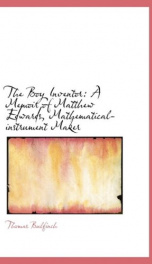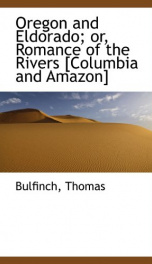Bulfinch Thomas

Thomas Bulfinch (July 15, 1796 - May 27, 1867[1]) was an American writer, born in Newton, Massachusetts. Bulfinch belonged to a well educated Bostonian merchant family of modest means. His father was Charles Bulfinch, the architect of the Massachusetts State House in Boston and parts of the U.S. Capitol in Washington, D.C.. Bulfinch supported himself through his position at the Merchants' Bank of Boston. Although Thomas Bulfinch reorganized Psalms to illustrate the history of the Hebrews, he is best known as the author of Bulfinch's Mythology, an 1881 compilation of his previous works: The compilation assembled posthumously by Edward Everett Hale, known simply as Bulfinch's Mythology includes various stories belonging to the mythological traditions known as the Matter of Rome, the Matter of Britain and the Matter of France, respectively. The volume was dedicated to Henry Wadsworth Longfellow and described on the title page as an "Attempt To Popularize Mythology, And Extend The Enjoyment Of Elegant Literature." In his preface Bulfinch outlined his purpose, which was His obituary noted that the contents were "expurgated of all that would be offensive". The versions Bulfinch gives for the classical myths are those in Ovid and Virgil. His Norse myths are abridged from a work by Paul-Henri Mallet, a professor at Geneva, translated by Bishop Thomas Percy as Northern Antiquities[2] (London, 1770, often reprinted). The Bulfinch version of myth, published for genteel Americans just as the first studies of mythography were appearing in Germany, presents the myths in their literary versions, without unnecessary violence, sex, psychology or ethnographic information. "Mr. Bulfinch was a gentleman of a pure Christian character," his obituary observed, "of delicate sensibilities and refined culture." The Bulfinch myths are an indispensable guide to the cultural values of the American 19th century, yet the Bulfinch version is still the version being taught in many American public schools. Marie Sally Cleary, The Bulfinch Solution: Teaching the Ancient Classics in American Schools (1990), sets the book in the context of "democratizing" classical culture for a wider American antebellum readership. Bulfinch was the product of Boston Latin School, Phillips Exeter Academy, and Harvard College, where he graduated in 1814. Though the Bulfinch retellings were largely superseded in American high schools by Edith Hamilton's works on mythology, a "sumptuously illustrated" edition was offered in the Christmas 1979 catalogue of the Metropolitan Museum of Art[3]
do you like this author?
What readers are saying
What do you think? Write your own comment on this book!
write a commentWhat readers are saying
What do you think? Write your own comment on this author!
write a commentBook list

the boy inventor a memoir of matthew edwards mathematical instrument maker
Series:
Unknown
Year:
Unknown
Raiting:
4/5
Show more
add to favoritesadd In favorites
Book list

the boy inventor a memoir of matthew edwards mathematical instrument maker
Series:
Unknown
Year:
Unknown
Raiting:
4/5
Show more
add to favoritesadd In favorites

oregon and eldorado or romance of the rivers columbia and amazon
Series:
Unknown
Year:
Unknown
Raiting:
5/5
Show more
add to favoritesadd In favorites
What readers are saying
What do you think? Write your own comment on this author!
write a commentGenre
- Nonfiction / Education / Education Theory / History
- Literature & Fiction / World Literature
- Books / Arthurian romances / History and criticism
- Books / Arthur,King
- Books / Different genres / Literature & Fiction / History & Criticism / Movements & Periods / Arthurian Romance
- Bibliography / Early printed books / Catalogs
- Reference / Atlases & Maps / World
if you like Bulfinch Thomas try:
readers also enjoyed
What readers are saying
What do you think? Write your own comment on this author!
write a commentGenre
- Nonfiction / Education / Education Theory / History
- Literature & Fiction / World Literature
- Books / Arthurian romances / History and criticism
- Books / Arthur,King
- Books / Different genres / Literature & Fiction / History & Criticism / Movements & Periods / Arthurian Romance
- Bibliography / Early printed books / Catalogs
- Reference / Atlases & Maps / World
if you like Bulfinch Thomas try:
readers also enjoyed
Do you want to read a book that interests you? It’s EASY!
Create an account and send a request for reading to other users on the Webpage of the book!


